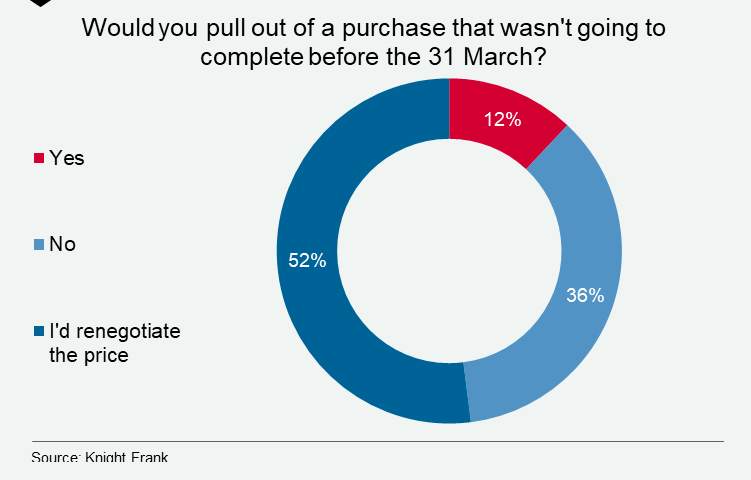UK Property Market Outlook: Week Beginning 22 February
With the end of the stamp duty holiday approaching and the conveyancing system under strain, close to 90% of the people that responded to our survey believe buyers should be given more time to complete their property purchases.
4 minutes to read
Later today we should have a roadmap out of lockdown, with Prime Minister Boris Johnson set to outline his plans to get the economy moving again, against the backdrop of falling infections and a rising vaccination rate.
However, in the case of the housing market, fuelled by pent-up demand and the introduction of a stamp duty holiday last July that runs until the 31 March, the question is how to mitigate any potential increase in sales falling through.
The stamp duty holiday has helped underpin housing market activity in recent months, but concern surrounding the ability to complete purchases prior to the deadline continues to rise. Consequently, some 87% of respondents to Knight Frank’s latest sentiment survey believe that Chancellor Rishi Sunak should extend the stamp duty holiday in the Budget next month.
The survey of more than 500 Knight Frank clients found strong support for an extension, with only 13% against. A quarter of respondents who believe the holiday should be extended suggested it should be tapered to afford extra time for buyers to complete.
However, while some deals may fall away if the stamp duty deadline is not extended, our survey suggests the impact may be limited. Asked if they would pull out of a deal if it wasn’t going to complete before the stamp duty holiday ends, 35% of respondents said they would not, while 13% said they would walk away. However, 52% said they would attempt to renegotiate the purchase price instead.

If speculation surrounding a six-week extension proves correct, the proportion of sales falling through will become an even smaller minority. For the Chancellor, a small loss of revenue may be worth bearing to avoid negative headlines.
It comes after an analysis by Knight Frank found significant regional variations in respect to how long the house buying process is taking, with the conveyancing system struggling to cope with demand.
While 46% of properties that went under offer between 1 August and 31 December 2020 have completed in the North West, the figure is just 28% in the South East, with significant variation at a local level.
Space race to continue
According to our survey, the latest lockdown appears to have reinforced trends that emerged after the market reopened last May, with the search for space, more greenery and the ability to work from home remaining at the forefront of people’s minds.
Last May, 53% of people said they planned to work from home more often than they did before the pandemic once restrictions ended. However, as of the start of this year this has increased to 65%.
Perhaps unsurprisingly, the most important attributes people are looking for now in a home are a home office/study, which was more important for two thirds (67%); a garden, outdoor space or access to land, which was more important for 72%; access to high-speed broadband, which was more important for 72%; and more space generally, which was more important for 53%.
The escape to the country trend doesn’t appear to have run its course either, with 38% of respondents stating that the latest lockdown had made them more likely to move to a rural location, compared with 8% that said they were less likely to do so. The results suggest that, even when the vaccination programme is complete and restrictions are eased, demand in regional markets is likely to remain strong, something which is reflected in our latest house price forecasts.
Other survey findings
- 36% of respondents are more likely to move in the next year as consequence of the latest lockdown. 19% are less likely to do so.
- 37% of people think their house value will rise between 1% to 5% in the next year, something we have explored in detail.
- 42% of respondents said they would use virtual viewings more often as part of their property searches even after the requirement to do so ends.
- 43% are less willing to commute for up to 60 minutes, and 56% less willing to commute for up to 90 minutes post-pandemic.
- A home offering privacy was more important to 57% of home buyers than it had been before the pandemic, compared with 43% that said so last May.
- The pandemic has not had an impact on the ability of 67% of respondents to assist family members with a home purchase.